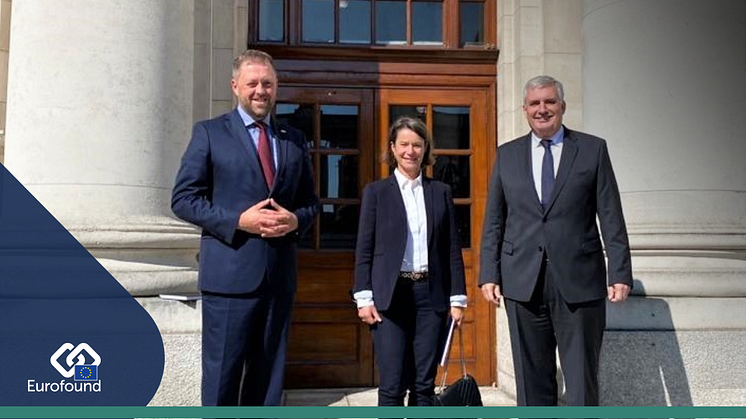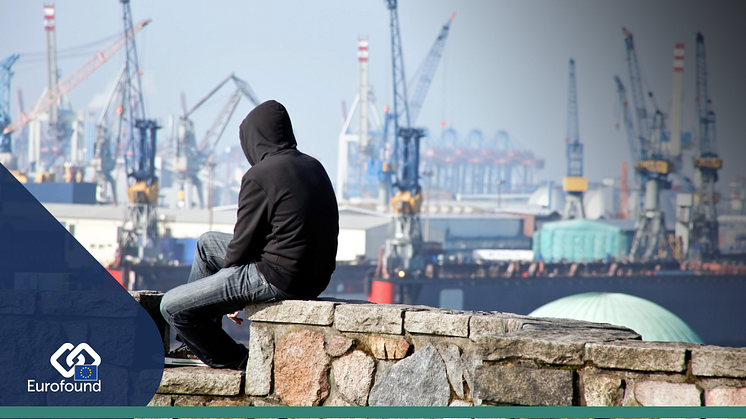
News -
COVID-19 one year on: A changed Europe
It has been over a year since the Coronavirus disease (COVID-19) hit Europe and many of the response measures necessary to deal with the pandemic, from working from home to social distancing, are now part of our everyday lives. In spring 2020, most citizens, although fearful of the devastating early impacts of the virus, did not envisage that their lives would be so dramatically impacted, and that the economic, social and work-related effects of the pandemic would drag on for so long.
COVID-19 has exposed how fragile the progress made on issues such as gender equality and socioeconomic convergence in Europe truly was, with women, young people, and the economically and socially marginalised most adversely impacted. Almost every aspect of our working and family lives has changed and, likewise, all of Eurofound’s research areas have been marked by COVID-19. Not only did we roll out three rounds of the now landmark Living, working and COVID-19 online survey in 12 months to analyse the rapid change that is ongoing, but the analyses in our existing surveys and flagship reports have specifically looked at the impacts of the pandemic across the board.
Unfortunately, findings to date paint a bleak picture. In spring 2021, mental well-being reached its lowest level across all age groups since the onset of the pandemic, with young people and those out of work most adversely affected. Our research also showed that over half (55%) of young people were at-risk of depression during the early stages of lockdowns across the EU, with Europe’s youth suffering disproportionately from social isolation and stymied educational and employment opportunities. Meanwhile, trust in institutions has plummeted, with trust in national governments across all EU Member States lower than at the start of the pandemic. Across Europe, citizens felt the divisive social and economic fallouts with a dwindling number viewing crisis support measures as fair and efficient.
As the pandemic endured it became clear that, although women appeared to be more resilient than men to COVID-19 in terms of health outcomes, that was not the case when it comes to the economic and social fallout. Measures taken by governments to control the spread of the virus exacerbated gender divides in unemployment, domestic labour and financial security, all to the disadvantage of women. Work–life conflict escalated for many people working from home, with mothers of small children often bearing the brunt of the impact.
While what has taken place has been tumultuous and devastating for many, the future also holds possibilities. Eurofound’s research has highlighted that COVID-19 could be a catalyst for fundamental change that will define the future of Europe, and that rather than ‘recovering’ from a crisis like we did a decade ago, we can instead reset our expectations for our lives and reshape our understanding of what we can achieve in cooperation; from building up our health and social systems, to adopting meaningful and ambitious policies to address climate change.
COVID-19 may have left many sectors and businesses dormant, but it has revolutionised other aspects of working life, with large swathes of the workforce working from home during the pandemic and increasingly questioning old paradigms. Despite ongoing issues with vaccine hesitancy, which Eurofound’s research helped bring to light – particularly in relation to the spread of misinformation – many EU countries have enjoyed success with their vaccine rollout. The public health threat of the virus gradually is receding and, in addition to the prioritisation of ensuring robust, resilient and coordinated health systems across the Union, the way that work is done may turn out to be one of the most important long-term consequences of the pandemic. Early indications show a workforce tentative to return to the office and, while mindful of the extra pressures and isolation that can result from working from home, many are reluctant to sign-up once more for long commutes and more time away from loved ones. For those in client-facing and manual roles and not able to work from home, the greater advantages of those that have more freedom to decide when and where to work acts as a further reminder of an unequal labour market.
These are all themes that Eurofound will be exploring in its research, with an immediate focus on how the lockdowns have changed the labour market, how digitisation has changed the workplace, how COVID-19 has impacted business continuity, and how crises impact equality and cohesion in Europe. The outbreak of COVID-19 in Europe may be moving gradually into history, but the long-term impacts of the pandemic on our work and lives is just beginning.
More information
Read the latest Living, working and COVID-19 report:
See the most recent blogs from our researchers
Explore the data from our Living, working and COVID-19 e-surveys:
Sign-up to receive forthcoming research:
- What just happened? COVID-19 lockdowns and change in the labour market
- Working time in 2019–2020
- Digitisation in the workplace
- Impact of COVID-19 on young people in the EU
- Occupational dimension of the gender pay gap
- European Jobs Monitor 2021: Gender gaps and employment structure
- Looking backward to move forward: Converging through crises
- COVID-19 and the impact on business continuity: Changes in workplace practices






